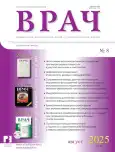Clinical manifestations of gastroesophageal reflux disease and anxiety in patients with metabolic syndrome
- 作者: Shrayner E.V.1,2, Kalashnikova K.E.1, Bystrova V.I.1,2, Lukichev D.A.1, Smirnova I.I.3, Sultanova A.N.3, Kudlay D.A.1,4,5
-
隶属关系:
- Novosibirsk State University
- Institute of Chemical Biology and Fundamental Medicine of Siberian Branch of the Russian Academy of Sciences
- Novosibirsk State Medical University, Ministry of Health of Russia
- I.M. Sechenov First Moscow State Medical University, Ministry of Health of Russia (Sechenov University)
- M.V. Lomonosov Moscow State University
- 期: 卷 36, 编号 8 (2025)
- 页面: 71-74
- 栏目: From Practice
- URL: https://journals.eco-vector.com/0236-3054/article/view/689988
- DOI: https://doi.org/10.29296/25877305-2025-08-14
- ID: 689988
如何引用文章
详细
Metabolic syndrome (MS) is a global medical and social concern that significantly impacts various physiological systems, including the gastrointestinal tract. One of the most common associated pathologies is gastroesophageal reflux disease (GERD). This study aimed to evaluate the severity of clinical manifestations of GERD and anxiety disorders in patients with MS. A comparative analysis was conducted between two groups: patients with combined MS and GERD, and patients with isolated GERD. The study included clinical examination, assessment using the Spielberger State-Trait Anxiety Inventory (STAI), and instrumental diagnostics. The results demonstrated higher levels of anxiety and more severe GERD symptoms in patients with MS. A statistically significant association was revealed between MS and esophageal mucosal injury.
全文:
作者简介
E. Shrayner
Novosibirsk State University; Institute of Chemical Biology and Fundamental Medicine of Siberian Branch of the Russian Academy of Sciences
编辑信件的主要联系方式.
Email: sch704@icloud.com
ORCID iD: 0000-0003-3606-4068
SPIN 代码: 1089-6080
Candidate of Medical Sciences
俄罗斯联邦, Novosibirsk; NovosibirskK. Kalashnikova
Novosibirsk State University
Email: sch704@icloud.com
ORCID iD: 0009-0003-2324-7102
俄罗斯联邦, Novosibirsk
V, Bystrova
Novosibirsk State University; Institute of Chemical Biology and Fundamental Medicine of Siberian Branch of the Russian Academy of Sciences
Email: sch704@icloud.com
ORCID iD: 0000-0003-3522-5384
SPIN 代码: 4479-6770
俄罗斯联邦, Novosibirsk; Novosibirsk
D. Lukichev
Novosibirsk State University
Email: sch704@icloud.com
ORCID iD: 0009-0000-5888-0651
俄罗斯联邦, Novosibirsk
I. Smirnova
Novosibirsk State Medical University, Ministry of Health of Russia
Email: sch704@icloud.com
ORCID iD: 0009-0009-1458-1399
SPIN 代码: 8992-2884
俄罗斯联邦, Novosibirsk
A. Sultanova
Novosibirsk State Medical University, Ministry of Health of Russia
Email: sch704@icloud.com
ORCID iD: 0000-0001-6420-6591
SPIN 代码: 5719-0860
MD
俄罗斯联邦, NovosibirskD. Kudlay
Novosibirsk State University; I.M. Sechenov First Moscow State Medical University, Ministry of Health of Russia (Sechenov University); M.V. Lomonosov Moscow State University
Email: sch704@icloud.com
ORCID iD: 0000-0003-1878-4467
SPIN 代码: 4129-7880
Professor, Corresponding Member of the Russian Academy of Sciences, MD
俄罗斯联邦, Novosibirsk; Moscow; Moscow参考
- Vrdoljak J., Kumric M., Vilovic M. et al. Can Fasting Curb the Metabolic Syndrome Epidemic? Nutrients. 2022; 14: 456. doi: 10.3390/nu14030456
- Hsieh Y.H., Wu M.F., Yang P.Y. et al. What is the impact of metabolic syndrome and its components on reflux esophagitis? A cross-sectional study. BMC Gastroenterol. 2019; 19: 33. doi: 10.1186/s12876-019-0950-z
- Городецкая И.В., Коневалова Н.Ю., Захаревич В.Г. Исследование ситуативной и личностной тревожности студентов. Вестник Витебского государственного медицинского университета. 2019; 18 (5): 120–7 [Gorodetskaya I.V., Konevalova N.Y., Zakharevich V.G. The study of the situational and personal anxiety of students. Vestnik VGMU. 2019; 18 (5): 120–7 (in Russ.)]. doi: 10.22263/2312-4156.2019.5.120
- Zamani M., Alizadeh-Tabari S., Chan W.W. et al. Association Between Anxiety/Depression and Gastroesophageal Reflux: A Systematic Review and Meta-Analysis. Am J Gastroenterol. 2023; 118 (12): 2133–43. doi: 10.14309/ajg.0000000000002411
- Choi J.M., Yang J.I., Kang S.J. et al. Association Between Anxiety and Depression and Gastroesophageal Reflux Disease: Results From a Large Cross-sectional Study. J Neurogastroenterol Motil. 2018; 24 (4): 593–602. doi: 10.5056/jnm18069
- Ji S., Chen Y., Zhou Y. et al. Association between anxiety and metabolic syndrome: An updated systematic review and meta-analysis. Front Psychiatry. 2023; 14: 1118836. doi: 10.3389/fpsyt.2023.1118836
- El-Serag H.B., Sweet S., Winchester C.C. et al. Update on the epidemiology of gastro-oesophageal reflux disease: a systematic review. Gut. 2014; 63 (6): 871–80. doi: 10.1136/gutjnl-2012-304269
- Ghoshal U.C., Sonthalia N., Roy A. et al. Metabolic Syndrome and Gastroesophageal Reflux Disease: Clinical Remission with Treatment, Beyond an Epidemiological Association. J Neurogastroenterol Motil. 2025; 31 (1): 1–2. doi: 10.5056/jnm24175
- Gyawali C.P., Yadlapati R., Fass R. et al. Updates to the modern diagnosis of GERD: Lyon consensus 2.0. Gut. 2024; 73 (2): 361–71. doi: 10.1136/gutjnl-2023-330616
- Calabrese F., Pasta A., Bodini G. et al. Applying Lyon consensus criteria in the work-up of patients with extra-oesophageal symptoms – A multicentre retrospective study. Aliment Pharmacol Ther. 2024; 59 (9): 1134–43. doi: 10.1111/apt.17934
- Karimian M., Salamati M., Azami M. The relationship between metabolic syndrome and increased risk of Barrett's esophagus: an updated systematic review and meta-analysis. BMC Gastroenterol. 2020; 20 (1): 138. doi: 10.1186/s12876-020-01267-2
- Kim Y., Park J.H., Kim D.H. et al. Impact of Metabolic Health and Its Changes on Erosive Esophagitis Remission: A Cohort Study. J Neurogastroenterol Motil. 2025; 31 (1): 43–52. doi: 10.5056/jnm24058
补充文件








